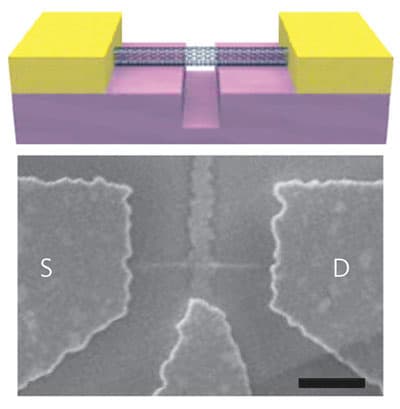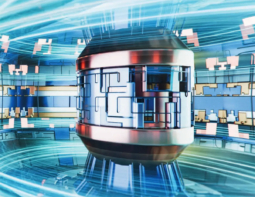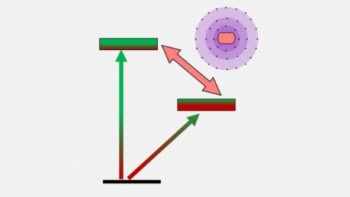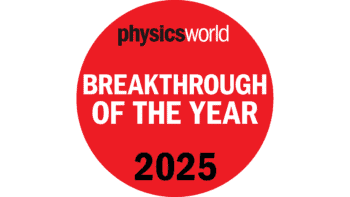
Researchers in Spain have made the most sensitive mass sensor ever. Capable of weighing a single proton – which has a mass of 1.7 yoctograms, or about 10–24 g – the device is made of a suspended carbon nanotube. The sensor could be used to detect single molecules or to study chemical reactions as they happen, and could even provide insights into the fundamentals of quantum mechanics.
The new mass sensor was made by Adrian Bachtold and colleagues at the Catalan Institute of Technology in Barcelona. It consists of a single suspended carbon nanotube that resonates at a certain frequency. “We can increase the pitch – or acoustic resonance frequency – of this ‘nanostring’ by reducing its length,” explains team member Julien Chaste. “Our resonator is very short (just 150 nm in length) and is 2 nm in diameter.”
The carbon nanotube resonates at 2 GHz. When a tiny particle sticks to the tube, this resonant frequency drops – with heavier particles lowering it more than lighter ones. The shift in resonant frequency can be monitored and used to calculate the mass of the particle.
Researchers have made such mass sensors before and these devices were able to detect masses of about 100 yoctograms. The new device can weigh objects 100 times lighter still.
Current annealing
Bachtold’s team boosted the sensitivity of the device by passing a large electric current through it to “clean” it. “Such current annealing was sufficient to get rid of some absorbed atoms, which act as contaminating ‘dust’,” Chaste explains. The experiments were also conducted under ultrahigh-vacuum conditions to reduce interference from ambient molecules to a minimum, and at temperatures of just 4 K to reduce thermal effects.
The researchers used their nanobalance to detect single naphthalene molecules and small numbers of xenon atoms. From this, they calculate that the mass sensor has a resolution of 1.7 yoctograms, which is around the mass of a single proton.
Following chemical reactions
The team says that its sensor might be used to distinguish different elements in a compound, which might differ by only a few protons. It would therefore be possible to follow chemical reactions as they occur, says Chaste.
“The record mass sensitivity of our device is related to its tiny size, but the nanoworld in general, and nanoresonators in particular, is ultrasensitive to small masses, forces, charges and magnetic moments,” he adds. “As well as mass detection, nanoresonators operating at ultralow temperatures might also be very interesting for fundamental studies in quantum physics.”
The work was reported in Nature Nanotechnology.



